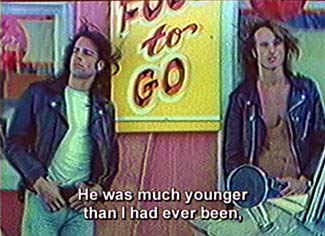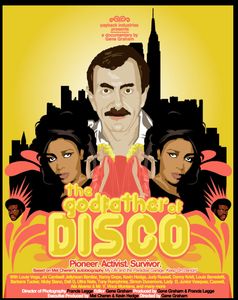Reeling Film Festival: "V.O." and "The Godfather of Disco"
By Rob Christopher in Arts & Entertainment on Nov 8, 2007 3:00PM
 Let's face it: we're spoiled when it comes to movies. Not only do the best (and worst) theatrical releases play here, but we also have scads of film festivals to choose from year-round. No sooner are CIFF and the Korean Film Festival over than Reeling is upon us.
Let's face it: we're spoiled when it comes to movies. Not only do the best (and worst) theatrical releases play here, but we also have scads of film festivals to choose from year-round. No sooner are CIFF and the Korean Film Festival over than Reeling is upon us.
Since 1981, Reeling, Chicago's gay and lesbian film festival, has been unspooling a vitally diverse cross-section of queer filmmaking. This year's schedule includes nearly 70 programs, starting tonight and running through November 18. The venues range from the Landmark Century and Chicago Filmmakers to the Chicago History Museum and the brand spanking new Center on Halsted, and with tickets at only $10 it's very affordable.
Two films in particular really impressed us: the experimental video V.O. and the music documentary The Godfather of Disco.
 Here's how movies work: to juxtapose is to connect. William E. Jones's video V.O. uses this simple, brilliant strategy by taking non-hardcore, "linking" sequences from vintage gay porn and juxtaposing them with the soundtracks of various classic foreign art films. The collision is a revelation, by turns hilarious and moving. By leaving out all the actual sex from the original porn, what we are left with is a strikingly ethnographic mosaic of a vanished world. Rough trade cruisers prowling the NYC subways, hideously bronzed Sunset Strip studs, a plethora of fringed leather boots and hot pants, and a frankness about longing and lust that's unexpectedly insightful. The soundtrack, which includes dialog from the films of Bunuel, Raul Ruiz and several obscure German movies, serves as an opaque commentary track. In one scene for example, we hear a woman recounting her story of meeting a sailor while we watch two men enact a complex ritual of flirtation on a streetcorner. V.O. is more than just a time capsule of the pre-AIDS era. By using the source materials for its own ends, it creates a new world of its own.
Here's how movies work: to juxtapose is to connect. William E. Jones's video V.O. uses this simple, brilliant strategy by taking non-hardcore, "linking" sequences from vintage gay porn and juxtaposing them with the soundtracks of various classic foreign art films. The collision is a revelation, by turns hilarious and moving. By leaving out all the actual sex from the original porn, what we are left with is a strikingly ethnographic mosaic of a vanished world. Rough trade cruisers prowling the NYC subways, hideously bronzed Sunset Strip studs, a plethora of fringed leather boots and hot pants, and a frankness about longing and lust that's unexpectedly insightful. The soundtrack, which includes dialog from the films of Bunuel, Raul Ruiz and several obscure German movies, serves as an opaque commentary track. In one scene for example, we hear a woman recounting her story of meeting a sailor while we watch two men enact a complex ritual of flirtation on a streetcorner. V.O. is more than just a time capsule of the pre-AIDS era. By using the source materials for its own ends, it creates a new world of its own.
 Once upon a time, people went to clubs because they were really excited to hear the latest music played by the most creative DJs. The Godfather of Disco uses the life of West End Records founder Mel Cheren to tell the story of how modern dance music evolved from 45s played on a jukebox to 12" singles blasting through sound systems costing tens of thousands of dollars. Since Chernin was one of the original copartners of legendary club Paradise Garage, DJ Larry Levan figures largely in the movie. Both were innovators: Cheren created the instrumental B-side, allowing a DJ to extend a song indefinitely by using two turntables; Levan championed the eclectic DJ set, one that would take listeners on a journey. Like a lot of other music documentaries, The Godfather of Disco simply tries to cram in too much music and too many interview subjects. We get dozens of brief snippets of historic club music, few of which have the chance to really register, while figures such as Tony Humphries, Jellybean Benitez, Nicky Siano and Junior Vasquez testify to Cheren's legacy. Regardless of its flaws however it's an important movie that, along with the recent book Turn the Beat Around, does a great deal to remind us just how political and revolutionary disco was in its heyday.
Once upon a time, people went to clubs because they were really excited to hear the latest music played by the most creative DJs. The Godfather of Disco uses the life of West End Records founder Mel Cheren to tell the story of how modern dance music evolved from 45s played on a jukebox to 12" singles blasting through sound systems costing tens of thousands of dollars. Since Chernin was one of the original copartners of legendary club Paradise Garage, DJ Larry Levan figures largely in the movie. Both were innovators: Cheren created the instrumental B-side, allowing a DJ to extend a song indefinitely by using two turntables; Levan championed the eclectic DJ set, one that would take listeners on a journey. Like a lot of other music documentaries, The Godfather of Disco simply tries to cram in too much music and too many interview subjects. We get dozens of brief snippets of historic club music, few of which have the chance to really register, while figures such as Tony Humphries, Jellybean Benitez, Nicky Siano and Junior Vasquez testify to Cheren's legacy. Regardless of its flaws however it's an important movie that, along with the recent book Turn the Beat Around, does a great deal to remind us just how political and revolutionary disco was in its heyday.
V.O. screens on Sunday and The Godfather of Disco screens on Monday. Details here.